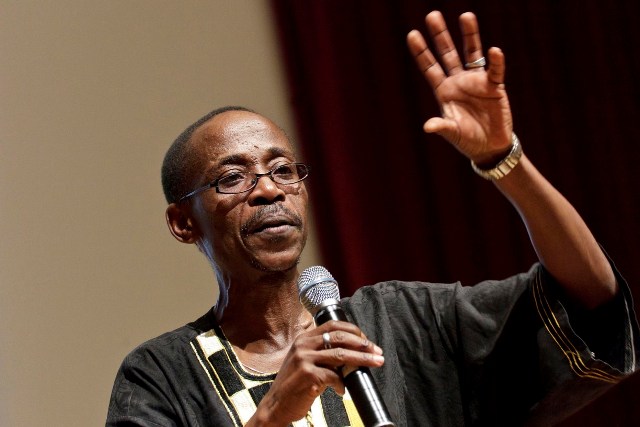Celebrating Zimbabwe’s Literary Icons: Chirikure Chirukure and His Enduring Legacy

With only two weeks left until the 45th Uhuru commemorations, it’s a fitting time to recognize and honor the writers who have shaped Zimbabwe’s literary landscape since 1980. As we reflect on the nation’s independence, it is crucial to acknowledge the literary contributions that have enriched the culture and intellectual fabric of Zimbabwe. The literary arts not only provide a creative outlet for expression but also foster a spirit of imagination, comprehension, and the joy of reading.
Among the luminaries who have helped define Zimbabwean literature are names like Mordecai Hamutyinei, Solomon Mutsvairo, Bernard Chidzero, Patrick Chakaipa, Charles Mungosi, Aaron Chiundura Moyo, and Ignatius Mabasa. These revered storytellers have captured the hearts of readers across the globe, and it’s through their work that Zimbabwe’s unique stories continue to resonate.
In this installment of “Down Memory Lane,” we honor one of Zimbabwe’s most cherished literary figures—Chirikure Chirukure. A revered storyteller, poet, publisher, and editor, Chirikure’s contributions to Zimbabwean literature are unmatched, with a career spanning over four decades. As one of the most influential voices in the industry, Chirikure has built an impressive body of work, and even after 40 years, he remains at the forefront of Zimbabwe’s literary scene.
Chirikure’s journey in the world of writing began with an intrinsic passion for creativity and an innate sense of community-building. Born the firstborn of seven siblings, it was clear that he was destined to lead and inspire others, much like his father, a writer and community leader in his own right. Through his father’s influence, Chirikure developed a deep sense of discipline and commitment to the craft of writing, a trait he still upholds today.
For Chirikure, independence is about more than just political freedom; it’s about total emancipation from all forms of repression. Reflecting on the significance of Zimbabwe’s Independence Day, Chirikure believes that it’s not just a celebration but a moment to honor the sacrifices made by many over generations. He emphasizes that these reflections are vital to his creative process. “Independence is a time to think about how far we’ve come and what principles we continue to uphold,” he said. “It’s a moment to reflect on the sacrifices that went into our freedom and how they are woven into the narrative of our national identity.”
Writing for Chirikure is a means of expressing his emotions, sharing his thoughts, and analyzing the political and social environment around him. He views writing as a tool to question whether the ideals of independence and progress have been met. His career as a writer has been shaped by a diverse range of influences, including musicians, fellow writers, and educators. These varied influences have enriched his writing and contributed to his success as a storyteller and cultural advocate.
As one of Zimbabwe’s leading mentors in the literary world, Chirikure has been instrumental in promoting the works of emerging writers and fostering a vibrant literary culture. In addition to his writing, he has played a key role in organizing literary festivals and events such as LitFest Harare, which has become an important platform for young, aspiring writers. He also regularly conducts group discussions at the National Gallery of Zimbabwe, a hub for creatives.
Chirikure’s dedication to the literary arts goes beyond the urban areas; he has been particularly focused on bridging the gap between rural and urban communities. In 2021, he established the Nemashakwe Community Library and Information Resource Centre in Gutu, Masvingo, in an effort to provide rural areas with access to books and a space for learning. The initiative, which has sourced over 4,000 books from Book Aid International in the UK, continues to impact the lives of many young people who now have the opportunity to engage with literature.
Reflecting on the writers he has worked alongside and lost, Chirikure expressed how deeply these figures influenced both his personal and professional life. From Dr. Solomon Mutsvairo and Mordecai Hamutyinei, to the younger generation including Chenjerai Hove, each one left an indelible mark on his journey. “I miss many of my fellow writers who have passed. Each one had a profound impact on me,” he said. His respect for these figures speaks to the rich literary tradition that continues to shape the country’s culture.
Chirikure’s commitment to literature is also evident in his work as a songwriter and his contributions to the translation of songs, books, and journals, helping bridge the language gap for a broader audience. Academically, he graduated from the University of Zimbabwe in the early 1980s, where he studied Shona and History, and his academic foundation has further enriched his work.
As we celebrate Zimbabwe’s independence, Chirikure urges us to honor those who sacrificed for the nation’s freedom by continuing to build the Zimbabwe they envisioned. “The best way to honor them is to build the Zimbabwe they fought for, to continue pursuing the vision they had for this country,” he said.
With over four decades of contributions to Zimbabwean literature, Chirikure Chirukure remains a vital figure whose work continues to inspire and shape the future of the nation’s literary community. As we approach the 45th Uhuru commemorations, let us reflect on the legacy of writers like Chirikure, whose words have the power to transcend time and continue to guide us toward a brighter, united future.




